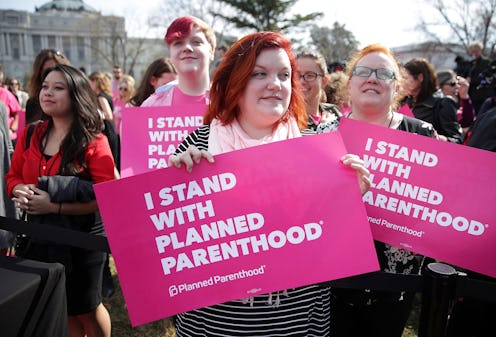
Donald Trump promised during his campaign that he would do everything in his power to defund Planned Parenthood — and yesterday, he took his first concrete action to do so: He stated that he would only consider not defunding Planned Parenthood if the organization stops providing abortions. If you support pregnant people's right to choose, it's hard to know what to say to people who support defunding Planned Parenthood if it continues offering abortions. But there are arguments for keeping Planned Parenthood's funding that may sway people regardless of their general position on abortion — and even if they run the risk of falling on the ears of those who refuse to hear them, they're still worth making nonetheless.
Trump presented the Planned Parenthood offer informally and explained it with a statement to The New York Times:
As I said throughout the campaign, I am pro-life and I am deeply committed to investing in women's health and plan to significantly increase federal funding in support of non-abortion services such as cancer screenings. Polling shows the majority of Americans oppose public funding for abortion, even those who identify as pro-choice. There is an opportunity for organizations to continue the important work they do in support of women's health, while not providing abortion services.
Trump's claims are misleading for a number of reasons. Here's how to point out their flaws and convince his decision's supporters that Planned Parenthood should keep its funding no matter what.
What Do They Believe Defunding Planned Parenthood Would Accomplish?
People don't generally advocate defunding Planned Parenthood merely out of spite; they likely think it'll accomplish something. Ask them what that is. If their goal is to see fewer abortions occur, some of the facts below about the actual relationship between Planned Parenthood and abortions may become useful.
Abortions Are A Great Minority Of Planned Parenthood's Services
Planned Parenthood offers STI tests, birth control, breast exams, and many other services, only three percent of which are abortions.
Tax Dollars Don't Go Toward Planned Parenthood's Abortions As It Stands
Trump claims that people don't want to see their tax dollars fund abortions, but here's the thing: They don't. It's illegal for government money to fund abortions except in the cases of incest or rape or when the pregnancy is life-threatening, so Planned Parenthood gets funding for its abortions elsewhere, according to FactCheck.org.
Planned Parenthood Prevents Abortions
The organization estimates that it prevents nearly 200,000 abortions per year by providing birth control. That's nearly as many as it performs: The organization gave 323,999 abortions in 2014.
Decreasing Abortion Access Does Not Decrease Abortions
If people aren't able to get abortions because Planned Parenthood isn't providing them, they'll likely either find an underground provider or attempt to perform one themselves. A study published in the Lancet found that countries where abortion is legal have the lowest abortion rates. So, ending the organization's abortion services probably won't lower the abortion rate; it'll just make abortions more dangerous.
Defunding Planned Parenthood Will Be A Disaster For Healthcare
2.5 million people per year rely on Planned Parenthood's services, and defunding the organization could mean that many or all of its 650 centers throughout the country close. That could be disastrous not just for people seeking abortions but also for people of all genders who require basic healthcare.
What Do They View As The Alternatives?
Planned Parenthood's opponents may already be aware of how many people depend it, so ask what they'd propose in place of the organization. If they bring up federal community health centers like Paul Ryan has, you may want to point out that people wait three to five days longer on average to get appointments with such providers, according to the Guttmacher Institute, and reproductive health needs can't always wait.